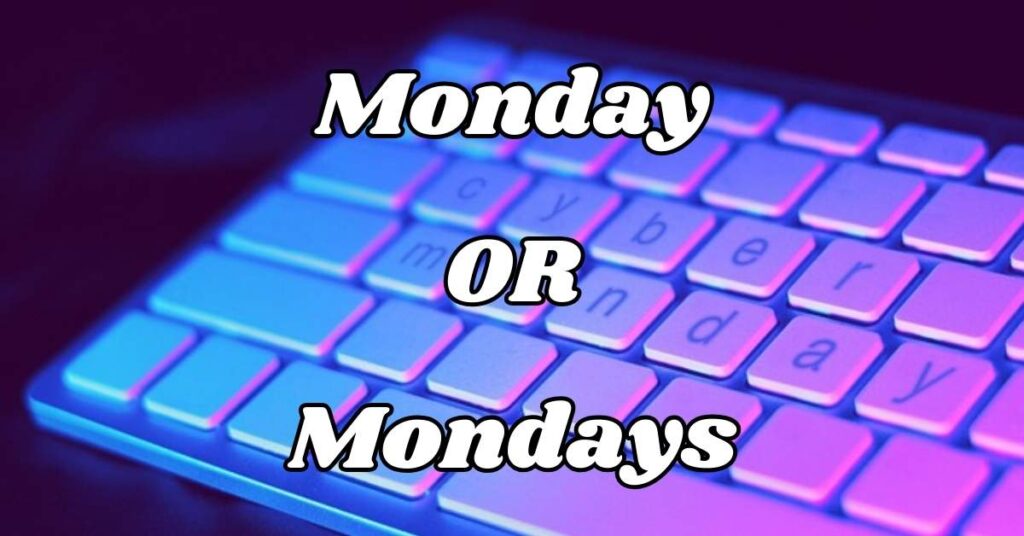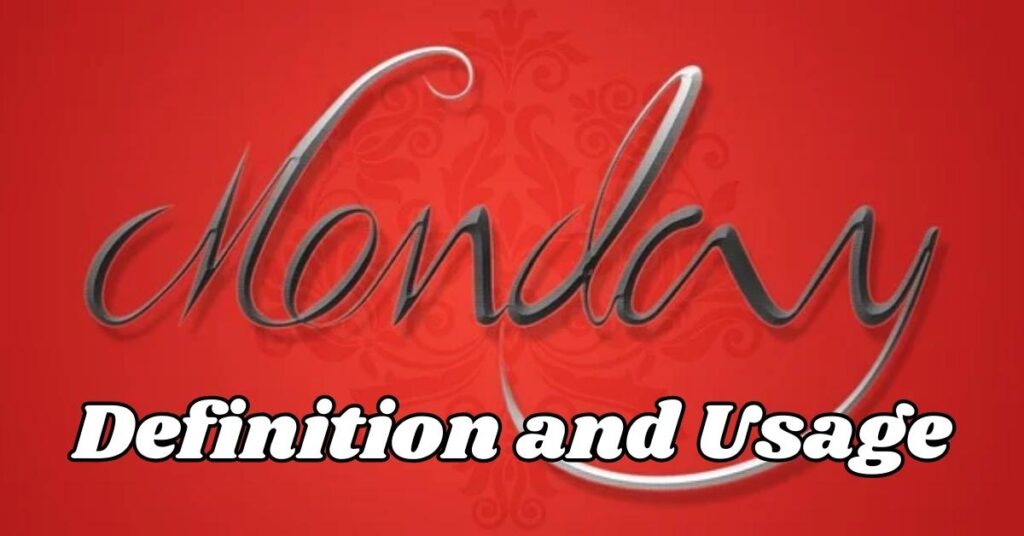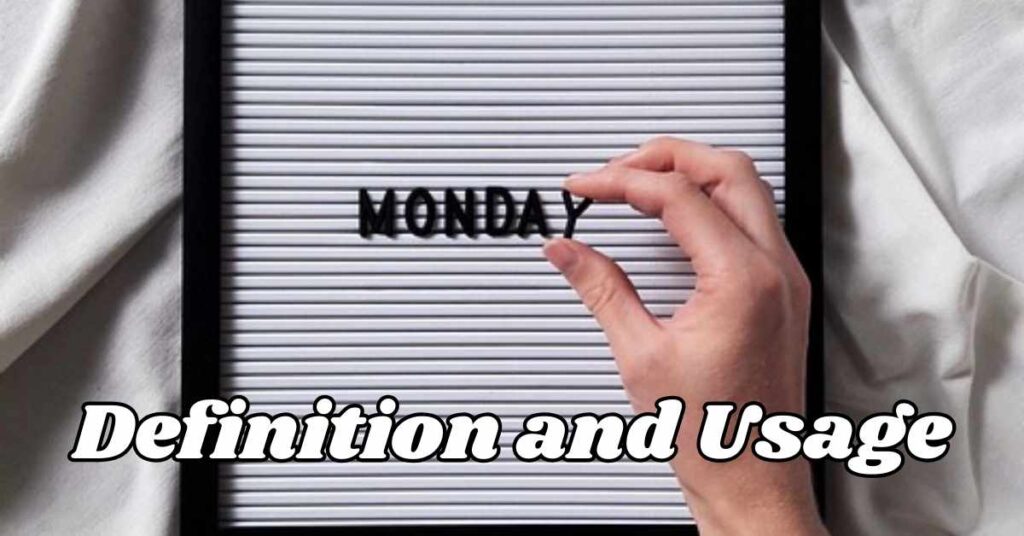Plural of Monday is a common source of confusion in English. Many wonder whether to use “Monday” and “Mondays” when referring to multiple occurrences. Understanding the Plural is crucial for clear communication, especially in writing, scheduling, and conversations.
This article will break down the differences between Monday or Mondays, explaining when to use each correctly. We will also explore the possessive form, covering both singular and plural possessives.
With clear example sentences and detailed explanations, you’ll gain confidence in using the correct form. Mastering these Monday variations will enhance your grammar skills, ensuring precise and effective language use in everyday communication, professional writing, and structured scheduling.
Quick Summary
This article clarifies the proper use of “Monday vs Mondays,” exploring their meanings and applications in various contexts. We’ll examine the etymology of “Monday,” provide example sentences demonstrating both singular and plural forms and explore possessive forms.
This guide aims to eliminate confusion surrounding these terms, ensuring you use them correctly in all your communications. We’ll also look at common phrases and contextual examples to solidify your understanding.
Understanding Monday or Mondays

The choice between “Monday” and “Mondays” hinges on context. “Monday” refers to a single instance of the first day of the week. It’s a singular noun, denoting one specific Monday.
It signifies multiple occurrences of this day, like when you say, “I dread Mondays.” This distinction is similar to how we differentiate other singular plural nouns, like “cat” and “cats.” Understanding this difference is key to using Monday variations correctly.
We’ll examine Monday as singular and Monday as plural through a variety of lenses, including singular possessive and plural possessive forms. Think of it this way: one Monday, many Mondays. We will also cover Monday’s times and Monday repetition.
Plural of Monday
The plural of Monday is unequivocally “Mondays.” This follows the standard English rule for pluralizing nouns by adding an “s” to the end. Just as “dog” becomes “dogs,” “Monday” becomes “Mondays.”
This simple rule applies across various contexts, whether you’re discussing Monday meetings, Monday deadlines, or Monday classes. Understanding noun forms and noun variations is crucial for accurate communication. We’ll look at Monday forms, covering both singular nouns and plural nouns.
Singular of Monday
The singular of Monday is, simply, “Monday.” It refers to a single, solitary instance of the first day of the week. This form is used when you’re talking about one specific Monday, such as, “I have a doctor’s appointment on Monday afternoon” or “Monday yoga is my favorite.”
Monday alone represents a single point in time. Monday singular usage is essential for clarity and precision. Monday described in a singular context helps to focus the time frame.
Monday as a Singular Noun in Example Sentences:
- My flight departs next Monday.
- Monday is my least favorite day.
- She has a dentist appointment on Monday.
- The project is due next Monday.
- Monday morning felt especially long.
- He always goes for a run on Monday.
- Monday marked the beginning of a new chapter.
- I look forward to Monday’s book club meeting.
- Monday is a fresh start.
- Monday’s weather forecast looks promising.
Monday as a Plural Noun in Example Sentences:
- I hate Mondays because of the traffic.
- Mondays are always hectic at work.
- She dreads Mondays after a relaxing weekend.
- He often works late on Mondays.
- Mondays seem to come around too quickly.
- They usually have team meetings on Mondays.
- Mondays are a challenge for many people.
- I try to be productive on Mondays.
- Mondays can be a drag.
- Many people find Mondays difficult.
Origins of the Word Monday
Monday, the second day of the week, originates from the Old English “mōnandæg,” meaning “moon’s day.” This name, shared across Germanic languages, is a loan translation of the Late Latin “Lunæ dies,” also the source for Romance language names for Monday.
Slavic languages often refer to it as “day after Sunday.” Historically, “Black Monday” referred to the Monday after Easter, while “Saint Monday” described workers’ tendency to be idle after Sunday’s revelry.
Monday: Definition and Usage

Monday, the first day of the work week for many, derives from the Old English “Mōnandæg,” meaning “moon’s day.” It follows Sunday and precedes Tuesday. “Monday” refers to a single instance of this day.
We use “Monday” in various contexts, from scheduling appointments to discussing specific dates. Understanding its singular usage is essential for clear communication. It’s a foundational element of how we organize our weeks.
Monday Meanings
“Monday” primarily denotes the first day of the week. However, it can also symbolize new beginnings, fresh starts, or the return to routine after the weekend. It often carries connotations of work, school, and the structured schedule that typically resumes after a break.
The feeling associated with Monday can vary, from anticipation to apprehension, depending on individual perspectives and circumstances.
Monday Usage
We use “Monday” in diverse situations, from setting deadlines (“The project is due next Monday”) to making plans (“Let’s meet for lunch on Monday“).
It’s a fundamental part of how we express time and organize our schedules. Whether discussing a specific date or a recurring event, “Monday” serves as a crucial point of reference in our daily lives.
Monday Example
“My doctor’s appointment is on Monday.” This simple sentence indicates a specific day and time. It’s a straightforward example of how “Monday” functions in everyday language.
The sentence is concise and easily understood, conveying the necessary information without ambiguity. It’s a practical demonstration of “Monday” in action.
Singular Possessive of Monday
The singular possessive of Monday is “Monday’s.” This form indicates ownership or association with a single Monday. It’s formed by adding an apostrophe and an “s” to the end of the word. This ties into the broader concept of possessives in English grammar.
Examples of Singular Possessive Form of Monday
- Monday’s meeting was canceled.
- Monday’s weather was surprisingly pleasant.
- Monday’s deadline is fast approaching.
- Monday’s announcement caused quite a stir.
- Monday’s news was rather unsettling.
- Monday’s events unfolded rapidly.
- Monday’s lecture was particularly engaging.
- Monday’s impact on the market was significant.
- Monday’s results were better than expected.
- Monday’s schedule is already full.
Plural Possessive of Monday
The plural possessive of Monday is “Mondays‘.” This form used less frequently, indicates ownership or association with multiple Mondays. It’s formed by adding an apostrophe after the “s” in the plural form. This concept is related to possessive plurals.
Examples of Plural Possessive Form of Monday
- Mondays’ challenges can be difficult to overcome.
- Mondays’ pressures can be overwhelming.
- Mondays’ demands often seem never-ending.
- Mondays’ early mornings are always a struggle.
- Mondays’ long days can be exhausting.
- Mondays’ effects can linger throughout the week.
- Mondays’ blues are a common phenomenon.
- Mondays’ anxieties are often heightened.
- Mondays’ tasks are frequently numerous.
- Mondays’ routines can become monotonous.
Mondays: Definition and Usage

“Mondays,” the plural form of “Monday,” refers to multiple instances of the first day of the week. It signifies recurring Mondays, habitual actions, or general statements about Mondays as a whole.
This plural form is essential for expressing repeated events or characteristics associated with multiple Mondays. It adds a dimension of frequency and regularity.
Mondays Meanings
“Mondays” signifies repeated occurrences of the first day of the week. It can imply a recurring pattern, a habitual experience, or a generalization about Mondays.
For example, “I always feel tired on Mondays” expresses a recurring feeling on multiple Mondays. It suggests a consistent experience over time.
Mondays Usage
We use “Mondays” when discussing multiple Mondays or a recurring pattern. For instance, “Mondays are always busy at the office” indicates a general trend.
It’s a way to express habitual actions or common experiences associated with this particular day of the week. The plural form allows us to discuss Mondays collectively.
Side by Side Comparison Monday vs Mondays
| Feature | Monday | Mondays |
| Definition | A single instance of the first day of the week | Multiple instances of the first day of the week |
| Usage | Singular context | Plural or recurring context |
| Example | “I have a meeting on Monday.” | “I hate Mondays.” |
| Plural Form | N/A | Yes |
| Singular Form | Yes | N/A |
Everyday Usage Examples

- “See you next Monday.” (Singular, referring to one specific Monday)
- “I hate Mondays.” (Plural, referring to Mondays in general)
- “Mondays are always hectic.” (Plural, referring to a recurring pattern)
- “My meeting is on Monday.” (Singular, referring to one specific Monday)
- “She works late on Mondays.” (Plural, referring to a recurring habit)
Monday Example in Context
“Monday morning started with a flurry of emails and phone calls, setting the tone for a busy week.” This example illustrates how “Monday” can be used to describe a specific point in time and the events associated with it.
It provides context and paints a picture of a typical Monday morning.
Mondays Example in Context
“She dreads Mondays because of her long commute and the overwhelming workload that awaits her.” This example demonstrates how “Mondays” can be used to express a recurring feeling or experience associated with multiple Mondays.
It highlights a pattern and provides insight into the speaker’s perspective.
More Article: Plural of Davis: Is it Davis’ or Davis’s
FAQs: Plural of Monday
Is it Monday or Mondays?
“Monday” is singular; “Mondays” is plural. Use “Monday” for a single instance and “Mondays” for multiple or recurring instances.
Is it correct to say “on Mondays”?
Yes, “on Mondays” is correct. It indicates a recurring action or event that happens on multiple Mondays.
Can Monday be plural?
Yes, “Monday” can be pluralized to “Mondays” to refer to more than one Monday.
Is Mondays a proper noun?
No, “Mondays” is not a proper noun. While “Monday” can be capitalized as part of a proper noun (e.g., “Monday Morning Show”), “Mondays” itself is a common noun.
Conclusion
Understanding the correct plural of Monday is essential for clear and accurate communication. While “Monday” denotes a single instance, “Mondays” signifies multiple occurrences. Mastering this distinction, along with the nuances of singular and plural possessive forms, empowers you to use “Monday” and “Mondays” correctly in any context.
By grasping these fundamental principles of noun forms and variations, you can confidently navigate the intricacies of English grammar and ensure your writing is both precise and professional. Remember, the correct use of “Monday and Mondays” contributes to effective communication and enhances clarity in your writing and speech.
Related Post: Oversight vs Oversite: What’s the Difference?

